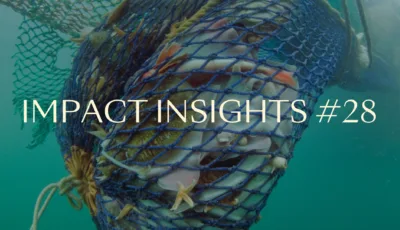Impact Insights #18

Our impact analyst, Inès van Tol, has curated the latest news from the sustainability field, providing a bitesize update on what you need to know to stay up to date.
■ Azerbaijan announces new international climate fund for developing countries funded by large emitters ahead of COP29
Last year's COP28 in Dubai saw the creation of a new fund to address the severe losses and damages vulnerable countries face due to climate change. It also witnessed a global agreement to transition away from fossil fuels. Ahead of the COP20 this November in Baku, the Azerbaijani government has announced the creation of a new Climate Finance Action Fund. Countries and companies involved in oil and gas extraction, and therefore largely responsible for the climate crisis, will be requested to voluntarily contribute USD 1 billion to this new international fund for climate mitigation and adaptation projects.
No mechanisms will be implemented to ensure that the largest emitters pay into the fund. This raises concerns about this type of initiative potentially becoming a distraction from the fact that large-emitting countries and corporations must prioritize a rapid fossil fuel phase-out or enable them to greenwash their continued operations. Although we have yet to determine which countries or companies have been approached, Azerbaijan will be a founding contributor.
■ Britain’s climate adaptation program is being challenged in court for failing to adequately protect its population’s human rights
Environmental campaigners have taken the British government to the High Court of London because they believe that the government's Third National Adaptation Programme (NAP3) does not set adequate objectives. The program is supposed to propose actions to reduce people’s exposure to climate change and enhance resilience against coastal flooding and extreme weather. However, the campaigners argue that the program lacks ambition and appropriate measures and as a result, breaches citizens' human rights. Claimants allege that they have lost their homes to rising sea levels and have been dangerously affected by overheating during heatwaves. This case is the first of its kind in the UK and was influenced by a recent ruling by Europe’s top human rights court, where the Swiss government was accused of violating its citizens’ human rights by failing to protect them from the adverse effects of climate change (see our #15 Impact Insights from May).
■ SBTI reports could encourage better corporate climate accountability by recommending the exclusion of carbon credits
After the board of the Science Based Targets initiative (SBTi) released a controversial statement in April, suggesting it would allow the use of carbon credits to help companies achieve their climate targets, a heated dispute emerged among SBTi staff. As a result, many in the standard-setting community began to question the organization's credibility and independence. After months of waiting, the SBTi has now finally published two papers indicating the future direction of its standards. First, the SBTi's Scope 3 Discussion Paper encourages companies to focus on key emission sources through specific transition targets and excludes the use of carbon credits from external activities in meeting emission goals. Indeed, the SBTi's Carbon Credit Synthesis Report highlights why carbon credits are ineffective for achieving corporate climate targets. The disputes currently affecting the SBTi are not unique to this organization. Similarly, a major revision of the GHG Protocol is underway, and the International Standards Organisation (ISO) is working to expand its 2022 Guidelines on Net Zero into a comprehensive ISO standard. The success of these initiatives—and especially the SBTi’s mission to “help prevent the worst impacts of climate change and future-proof business growth”—will depend on their ability to resist undue influence and maintain the integrity of their standards.
■ Biden withdraws from election: Harris-Walz ticket promises strong climate action and environmental justice. Trump aims to repeal existing environmental regulations
Joe Biden is deemed to have passed some of the most far-reaching climate policies the US ever had. An example is the Inflation Reduction Act of 2022 which announced the goal of reducing carbon emissions by 40% by 2030 and allocated hundreds of billions of dollars to directly accelerate the development of clean energy, electric vehicles, and energy efficiency improvements. This has resulted in the creation of many green jobs and community improvements in Republican states. After Biden pulled out of the race, we are focusing on the current VP’s promises concerning climate action. According to her track record as California attorney general and San Francisco district atonement, Kamala Harris has prosecuted several oil and gas companies such as ExxonMobile, and created the country’s first environmental justice unit to address environmental crimes against vulnerable residents. With a hard line on oil & gas and environmental justice, Kamala Harris and her VP candidate Tim Walz are considered the ticket for a just transition. Trump and his Project 2025 plan, on the other hand, suggest repealing several existing regulations designed to reduce GHG emissions and air pollution from factories, reconsidering limits on PFAS “forever chemicals,” and eliminating E.P.A.’s Office of Environmental Justice, among other points.
■ Paris 2024 setting new sustainability standards for future sports events, with ambitions to limit emissions to half that of London 2020 and Rio 2016
This year’s Olympic games in Paris promised to reduce environmental impacts while maximizing economic and social benefits, compared to previous Olympic editions. This emphasis on sustainability had been anticipated, as the event was in the same city where global leaders had gathered in 2015 to pledge to limit global temperature rise to 1.5 degrees. The organizing committee of Paris 2024 had committed to following the International Olympic Committee (IOC) roadmap, aiming to limit the event’s greenhouse gas emissions to half the average emissions of the 2020 London and 2016 Rio Olympics, with a ceiling of 1.75 million tonnes of CO2. This calculation includes scope 1, 2, and 3 emissions, accounting for spectator travel emissions, which can make up to 80% of a sporting event's total emissions. Other noteworthy actions included using existing infrastructure for 95% of the venue, strategically planning new venues to benefit under-invested Paris neighborhoods post-event, using recycled and recovered materials for furniture, locally sourcing 100% renewable energy, doubling the supply of plant-based food for spectators, and implementing new low-emission transport infrastructure in the city.
Additionally, Paris 2024 released a Pre-Games Sustainability Report using new OECD guidelines on event Impact Assessment and clear metrics for evaluating impacts. These measures contributed to expanding and updating the ISO 20121 Event Sustainability Management Systems Standard, which all future games must adhere to. According to Nature, two important actions are still needed to make the Olympic Games more sustainable: reducing the size of the event and rotating the Olympics among the same cities.


